Since most Americans:
Have no sense of history and
Never put themselves in others’ shoes
…I quickly threw this together this incomplete reminiscence of long forgotten U.S./Russian history, for future reference. За здоровье!
Margarita Simonyan, RT editor-in-chief, 2018
Lesley Stahl:
I get the impression though that your views of the United States have kinda curdled.
Margarita Simonyan:
It didn't just happen to me. It happened to more or less all of Russians in 1999 when you bombed Yugoslavia.
The U.S. called that NATO operation a humanitarian intervention to prevent ethnic cleansing. But to Russia, it was a sign of U.S. aggression too close to home.
We found that absolutely unfair, outrageous-- illegal because it wasn't approved of by the United Nations. It was a shock. America had Russia wrapped around it little-- little pinky through the whole '90s. We did everything you told us. And we were eager to do more and more. The whole nation-- Russian nation was like, "Tell us what else we can do to please you. We want to be like you. We love you." And then in 1999 bam. You bomb Yugoslavia. And that was the end of it. In a minute, in one day. And that's when you lost us unfortunately.
Noam Chomsky, Phil Donahue and Vladimir Pozner (1993)
Deterring Democracy is the title of a 1992 book Noam Chomsky - yes, with all his faults - wrote, that I found influential.
“..the Kosovo war proved a handmaiden of two decades of disastrous interventions abroad. American hyperpower hubris, set free in a tiny corner of the Balkans, would unleash far more disastrous interventions in far more important regions of the world.
Then-secretary of state James Baker had said of Yugoslavia in 1991, “We don’t have a dog in that fight.”
Since Kosovo, America has found fights wherever it looked for them.”
Rescuing Boris, July 1996
a.k.a “Foreign Election Interference”
"The secret story of how four U.S. advisers used polls, focus groups, negative ads and all the other techniques of American campaigning to help Boris Yeltsin win."
Some highlights…
Voting in the final round of the presidential election last week, they preferred Boris Yeltsin to his Communist rival Gennadi Zyuganov by a margin of 13 percentage points. He is far from the ideal democrat or reformer, and his lieutenants Victor Chernomyrdin and Alexander Lebed are already squabbling over power, but Yeltsin is arguably the best hope Russia has for moving toward pluralism and an open economy. By re-electing him, the Russians defied predictions that they might willingly resubmit themselves to communist rule.
The outcome was by no means inevitable. Last winter Yeltsin’s approval ratings were in the single digits. There are many reasons for his change in fortune, but a crucial one has remained a secret. For four months, a group of American political consultants clandestinely participated in guiding Yeltsin’s campaign. Here is the inside story of how these advisers helped Yeltsin achieve the victory that will keep reform in Russia alive…
Most of Yeltsin’s confidants believed the President would be magically re-elected despite the Duma catastrophe, but Braynin thought otherwise. The President, he reasoned, could lose without the same kind of professional assistance U.S. office seekers employ as a matter of course. Braynin began a series of confidential discussions with Yeltsin’s aides, including one with First Deputy Prime Minister Oleg Soskovets, who at the time was in charge of the President’s nascent re-election effort. Finally, in early February, Braynin was instructed to “find some Americans” but to proceed discreetly. “Secrecy was paramount,” says Braynin. “Everyone realized that if the Communists knew about this before the election, they would attack Yeltsin as an American tool. We badly needed the team, but having them was a big risk.”
…Even before their polling confirmed their suspicions, the Americans intuited that Yeltsin would lose and lose badly if the election were a referendum on his stewardship. Most Russians, the polls and focus groups found, perceived Yeltsin as a friend who had betrayed them, a populist who had become imperial. “Stalin had higher positives and lower negatives than Yeltsin,” says Dresner. “We actually tested the two in polls and focus groups. More than 60% of the electorate believed Yeltsin was corrupt; more than 65% believed he had wrecked the economy. We were in a deep, deep hole.”
…“‘Stick with Yeltsin and at least you’ll have calm’–that was the line we wanted to convey,” says Dresner. “So the drumbeat about unrest kept pounding right till the end of the run-off round, when the final TV spots were all about the Soviets’ repressive rule.”
…The Americans were “vital,” says Mikhail Margolev, who coordinated the Yeltsin account at Video International. Margolev had worked for five years in two American advertising agencies but freely acknowledges that his methods are still influenced by his earlier tenure as a propaganda specialist for the Soviet Communist Party and as an undercover KGB agent masquerading as a journalist for TASS, the Russian news agency. “The Americans helped teach us Western political-advertising techniques”
…“The idea was to have Yeltsin stand up to the West, just like the Communists insisted they would do if Zyuganov won,” says a Clinton Administration official. “By having Yeltsin posture during that summit without Clinton’s getting bent out of shape, Yeltsin portrayed himself as a leader to be reckoned with. That helped Yeltsin in Russia, and we were for Yeltsin.”
…The Americans advised on staging crowds (and government employees were regularly instructed to attend Yeltsin’s rallies). They conceived Russia’s first-ever serious direct-mail effort (a letter from Yeltsin to Russian veterans thanking them for their service). They designed a campaign to use Yeltsin’s wife Naina on the stump, where she was regularly well received. And they fought continuously all suggestions that Yeltsin debate Zyuganov. “He would have lost”
…A bit of relief came when a CNN correspondent reported that “the only thing voters we’ve spoken with like less than Yeltsin is the prospect of upheaval.” Dresner howled. “It worked,” he shouted. “The whole strategy worked. They’re scared to death!”
The final tally for the first round showed that Yeltsin had edged out Zyuganov 35% to 32% (the Communists had indeed been held to the level they reached in December)…Why, with unlimited funds, expert advice and the media in his pocket, did Yeltsin win the first round by only three points?…“He never overcame the fact that most Russians can’t stand him,” says Dresner. “Anyone but a communist would probably have beaten him.”
…Russia took a historic step away from its totalitarian past. Democracy triumphed–and along with it came the tools of modern campaigns, including the trickery and slickery Americans know so well. If those tools are not always admirable, the result they helped achieve in Russia surely is. But just as in America, the consultants can only take Yeltsin so far.
The Wall Street Journal's Russia Scandal (1999)
a.k.a. CNBC’s Steve Liesman is aptly named.
“The record shows that Liesman's bureau was little more than a PR conduit for a corrupt regime, consistently averting its eyes from the ugly truth.”
Just before Christmas in 1997, as a tumultuous stock-market crisis ravaged emerging markets in every corner of the globe, readers of the Wall Street Journal were treated to some good news: Russia was going to emerge from the mess unscathed. While conceding that "few debt markets outside Southeast Asia were hit harder by recent financial turmoil than Russia's," the Journal's Moscow bureau chief, Steve Liesman, added quickly that "many analysts believe an equally strong rebound may be in the offing." Moreover, Liesman wrote, investors were rapidly coming to the realization that "Russia's problems are far different and, for the moment, less dire than those that undermined Asian economies." The December 16 piece was headlined, "Russian Debt Markets Due for Rebound."
A few weeks later, Liesman and the Journal used even stronger language to trumpet Russia's economic merits. They chided investors who were too busy "fretting over Asia's financial crisis" to notice what they called "one of the decade's major economic events: the end of Russia's seven-year recession."
The Journal's prediction was more than a little precipitate. Instead of getting better, things in Russia got worse. A lot worse. Nine months after Liesman declared that Russia's debt market was due for a rebound, and just over seven months after proclaiming the end of the Russian recession, the Journal--like most US newspapers--found itself having to explain the near-total collapse of Russia's economy and capital markets.
What is most astonishing is not how badly Liesman and the Journal misreported one of the most tragic economic stories of the decade as it was happening. The amazing thing is that they won a Pulitzer Prize for their reporting of the Russian crisis after the country had gone down in flames. Liesman, who left the Moscow bureau in April of 1998 to return to New York, was called back to Moscow after the crisis to help write a series of Journal pieces on how the Russian financial collapse happened. These articles completely contradicted the body of work he had left behind, leaving the impression that the collapse had been inevitable all along.
While it's true that throughout the mid-nineties nearly the entire Western press corps had painted a similar picture of allegedly successful, if bumpy, market reform in Russia, the Wall Street Journal's version was even more deluded, and more inappropriately enthusiastic, than the competition's. Furthermore, few if any of those other outlets, with the possible exception of the New York Times, have as much influence internationally as the Journal. And none of those other reporters won the Pulitzer Prize. To win that, the Journal ought to have been ahead of the pack throughout; as it was, the paper's coverage only stood out as the most spectacular wreck in a huge pileup.
Liesman's Russia coverage was a case study in the kind of narrow colonialism and provincialism that is increasingly pervasive in American foreign news reportage.
Until the crisis struck, Western reporters based in Moscow focused almost exclusively on the Russia story in terms of its relevance to Western businessmen--and as long as the stock market was doing well, and companies like British Petroleum were still proudly announcing mergers with Russian partners, much of the corruption that eventually sank the Russian economy was ignored. As a result, an event like the recent Bank of New York debacle actually came as something of a surprise to Americans. But for ordinary working Russians, a great many of whom have been watching their bosses send company money offshore for years while their own salaries go unpaid, the only surprise in the New York money-laundering story was that it didn't come out sooner. And one reason it didn't is that the Western press, particularly pro-"reform" cheerleaders like the Journal, was plainly uninterested, until it was far too late, in making an effort to see the corruption that was a daily reality for the majority of Russians.
In fact, until the crisis forced them to change their tune, Western reporters like Liesman seemed to distrust reports of widespread public despair over the Yeltsin regime's criminal policies, preferring instead to rely upon the stock market, the pronouncements of the IMF and the results of Russian state-produced macroeconomic reports to tell them how the Russian economy was doing.
As journalists Matt Bivens and Jonas Bernstein wrote in an article in the academic journal Demokratizatsia, which criticized Western press performance (including that of the Wall Street Journal) in post-Communist Russia: "Sadly, there is another dynamic at work here, an element of disdain for the Russians as a people.... [Many] Westerners have sympathy for the idea that following centuries of oppression, the Russians 'aren't ready' to be trusted with complete democracy. Perhaps, then, it is better to let former Vice Premier Anatoly Chubais and his Harvard-trained whiz kids manipulate matters--always, of course, 'in the larger interest.'"
Liesman, 36, a bombastic, balding New Yorker whose amateur blues band played a few coolly received gigs in Moscow clubs in his early years here, is still well known in the Moscow press corps as a sort of caricature of a typical Moscow-based US correspondent--a loud presence at press conferences and a knee-jerk anti-Communist. Despite having lived in Russia since 1992, when he came to work for the English-language Moscow Times, Liesman was still using a translator in 1998, the year he left.
…Like many of the more linguistically challenged members of the foreign press corps in Moscow, Liesman fell into the classic trap of making one small group of English-speaking Russian politicians his most trusted source of information. That clique--including privatization czar Chubais, early Prime Minister Yegor Gaidar and allies of theirs like onetime property chief Maxim Boycko--was often referred to by Russia observers as the "St. Petersburg Mafia" (most of the group came from the northern capital). This group sold itself to the Western press as the vanguard of the anti-Communist, pro-Western movement and nudged reporters like Liesman into portraying any criticism of their policies as aid to the Communist movement.
Liesman's unwillingness to report any negative news associated with the St. Petersburg Mafia first became glaringly obvious in early 1996, when he called privatization "the most successful and important of Russia's reforms." Part of the privatization effort that Liesman praised, the notorious "loans-for-shares" auctions, had just created a national scandal due to their overt criminality; it had forced loans-for-shares architect Chubais out of government. In these auctions of huge stakes in key Russian enterprises, Kremlin insiders decided the winners in advance, often helping out by padding their bids with government funds. These auctions instantly created a super-rich clique of monopolist "robber barons"--many of whom were much-vilified names in the US press this past summer, when they began appearing in connection with investigations into the Bank of New York scandal.
The criminality of these auctions was well detailed in the Russian- and English-language press: Izvestia, for instance, reported that $50 million in Ministry of Finance funds had been transferred to Bank Menatep before the latter won a huge stake in the oil company Yukos, and more than one paper noted the curious anomaly of two banks (Stolichny Bank and Menatep) guaranteeing each other's bids in a "competitive" auction for a stake in the oil company Sibneft. The winning bid in that auction was just $100.3 million, despite the fact that the company, which at the time produced more than 22 million tons of crude per year, was clearly worth a lot more. Most observers at the time believed that the sweeping victory by the Communists in the 1995 parliamentary elections was at least partly fueled by public disgust over these bogus auctions. And every sane observer recognized that the auctions represented a profound step away from the Western capitalist model. Even the cautiously neoliberal Moscow Times criticized the auctions in a December 30, 1995, editorial: "As more than one commentator has said, this isn't capitalism as the country ought to know it.... While it goes on, and there is no reason to think that it will stop, economic growth will be held back, and cronyism and cartels will prevent meritocracy and open markets."
Liesman didn't see it that way. His Journal coverage ignored the auctions' reported improprieties and dismissed their critics as Communists and political malcontents…While Western businessmen on the ground in Moscow saw the disaster of the Russian state in action--evident in their mass flight from Russia's capital markets beginning in late 1997--Journal readers abroad were taken completely by surprise when catastrophe struck. As late as June 1998, when Russia's capital markets teetered on the edge of collapse and worker protests over nonpayment of wages paralyzed rail travel across the country, the Journal was still dismissing Russia's troubles as fallout from a few logistical glitches.
…before the crash, pro-reform journalists like Liesman often justified placing a positive spin on the Russian economy by noting that their sources in places like Credit Suisse were constantly pumping up Russia as a hot market. The brokers, the thinking goes, were the experts--so how could a reporter be remiss by trusting them? Answer: very easily. Any good business reporter knows that few stock analysts or brokers in emerging markets will go on the record as saying anything negative about their host country's economies--because if they do, no one will buy into its market. Asking a Credit Suisse trader in Moscow to be straight about the Russian market is like asking a Ford dealer to compare a Taurus with a Lexus honestly. Quoting analysts is fine to get the bright side of a story, but a responsible reporter looks for hard economic data for balance--and this is what was consistently missing from the Journal's coverage.
The View from Here
“This may be a good time for Americans to take a look in the mirror. Putin didn’t create his oligarchy on his own. The wealth that this circle of men was awarded (control of assets such as oil, gas, and aluminum after the collapse of the Soviet Union) was partly made possible by the well-meaning arrogance of economists such as Jeffrey Sachs and Larry Summers, as well as Robert Rubin, who was Treasury secretary under Bill Clinton.
In the Clinton administration, they were in an Ivy League clown car of advisers who prodded Boris Yeltsin to apply “shock therapy” to the post-Soviet economy and turbocharge it into a free-market system.”
- Alessandra Stanley (2022)
It’s important to remember that Putin wasn’t elected; he was appointed acting president by Yeltsin a year after the ruble collapse of 1998, at a moment of deep disillusionment and fear. For years, even some of my most liberal Russian friends felt that democratic freedom was a fantasy, and that putting up with Putin was a small price to pay for economic stability.
Meanwhile, Putin reorganized the oligarchy he’d inherited in his own image, putting loyalists in the place of cocky troublemakers like Mikhail Khodorkovsky, who had grabbed hold of Yukos Oil under Yeltsin. Khodorkovsky thought he could speak his mind under Putin and was rewarded with nine years in prison. Other business tycoons and government officials in Putin’s inner circle got the message, fell in line, and were richly rewarded for it.
But let’s not forget that their overseas holdings, secret bank accounts, and tax havens would not have been as accessible without the unfettered, unregulated financial system that Wall Street, the White House, and Congress have stoked—and, as we’ve seen recently, sometimes used for personal financial gain—for decades.
As they did with the Russian economy, American policymakers in both parties (including, by the way, Joe Biden, when he led the Foreign Relations Committee) pushed the pedal hard on NATO’s eastward expansion, without fully understanding how Russia would react. George W. Bush made it worse by insisting in 2008 that the North Atlantic military alliance could even absorb Ukraine and Georgia.
The invasion of Ukraine may look like a folie à un [shared psychotic disorder], but as my friend Andrew Gould, a banker and longtime Russia-watcher, put it: “Putin kept warning the West that if something wasn’t done to restrain NATO expansion, he would do it himself. And now he has.”
The Harvard Boys Do Russia (1998)
After seven years of economic “reform” financed by billions of dollars in U.S. and other Western aid, subsidized loans and rescheduled debt, the majority of Russian people find themselves worse off economically. The privatization drive that was supposed to reap the fruits of the free market instead helped to create a system of tycoon capitalism run for the benefit of a corrupt political oligarchy that has appropriated hundreds of millions of dollars of Western aid and plundered Russia’s wealth.
The architect of privatization was former First Deputy Prime Minister Anatoly Chubais, a darling of the U.S. and Western financial establishments. Chubais’s drastic and corrupt stewardship made him extremely unpopular. According to The New York Times, he “may be the most despised man in Russia.”
…Through the late summer and fall of 1991, as the Soviet state fell apart, Harvard Professor Jeffrey Sachs and other Western economists participated in meetings at a dacha outside Moscow where young, pro-Yeltsin reformers planned Russia’s economic and political future. Sachs teamed up with Yegor Gaidar, Yeltsin’s first architect of economic reform, to promote a plan of “shock therapy” to swiftly eliminate most of the price controls and subsidies that had underpinned life for Soviet citizens for decades. Shock therapy produced more shock–not least, hyperinflation that hit 2,500 percent–than therapy. One result was the evaporation of much potential investment capital: the substantial savings of Russians…
The U.S. Agency for International Development (U.S.A.I.D.), without experience in the former Soviet Union, was readily persuaded to hand over the responsibility for reshaping the Russian economy to H.I.I.D., which was founded in 1974 to assist countries with social and economic reform.
H.I.I.D. had supporters high in the Administration. One was Lawrence Summers, himself a former Harvard economics professor, whom Clinton named Under Secretary of the Treasury for International Affairs in 1993. Summers, now Deputy Treasury Secretary, had longstanding ties to the principals of Harvard’s project in Russia and its later project in Ukraine.
Summers hired a Harvard Ph.D., David Lipton (who had been vice president of Jeffrey D. Sachs and Associates, a consulting firm), to be Deputy Assistant Treasury Secretary for Eastern Europe and the Former Soviet Union. After Summers was promoted to Deputy Secretary, Lipton moved into Summers’s old job, assuming “broad responsibility” for all aspects of international economic policy development. Lipton co-wrote numerous papers with Sachs and served with him on consulting missions in Poland and Russia. “Jeff and David always came [to Russia] together,” said a Russian representative at the International Monetary Fund. “They were like an inseparable couple.” Sachs, who was named director of H.I.I.D. in 1995, lobbied for and received U.S.A.I.D. grants for the institute to work in Ukraine in 1996 and 1997…
As Yeltsin’s Russian government took over Soviet assets in late 1991 and early 1992, several privatization schemes were floated. The one the Supreme Soviet passed in 1992 was structured to prevent corruption, but the program Chubais eventually carried out instead encouraged the accumulation of property in a few hands and opened the door to widespread corruption. It was so controversial that Chubais ultimately had to rely largely on Yeltsin’s presidential decrees, not parliamentary approval, for implementation. Many U.S. officials embraced this dictatorial modus operandi, and Jonathan Hay and his associates drafted many of the decrees. As U.S.A.I.D.’s Walter Coles, an early supporter of Chubais’s privatization program, put it, “If we needed a decree, Chubais didn’t have to go through the bureaucracy.”
With help from his H.I.I.D. advisers and other Westerners, Chubais and his cronies set up a network of aid-funded “private” organizations that enabled them to bypass legitimate government agencies and circumvent the new parliament of the Russian Federation, the Duma. Through this network, two of Chubais’s associates, Maxim Boycko (who co-wrote Privatizing Russia with Shleifer) and Dmitry Vasiliev, oversaw almost a third of a billion dollars in aid money and millions more in loans from international financial institutions…
Anne Williamson, a journalist who specializes in Soviet and Russian affairs, details these and other conflicts of interest between H.I.I.D.’s advisers and their supposed clients–the Russian people–in her forthcoming book, How America Built the New Russian Oligarchy. For example, in 1995, in Chubais-organized insider auctions of prime national properties, known as loans-for-shares, the Harvard Management Company (H.M.C.), which invests the university’s endowment, and billionaire speculator George Soros were the only foreign entities allowed to participate. H.M.C. and Soros became significant shareholders in Novolipetsk, Russia’s second-largest steel mill, and Sidanko Oil, whose reserves exceed those of Mobil. H.M.C. and Soros also invested in Russia’s high-yielding, I.M.F.-subsidized domestic bond market.
Even more dubious, according to Williamson, was Soros’s July 1997 purchase of 24 percent of Sviazinvest, the telecommunications giant, in partnership with Uneximbank’s Vladimir Potanin. It was later learned that shortly before this purchase Soros had tided over Yeltsin’s government with a backdoor loan of hundreds of millions of dollars while the government was awaiting proceeds of a Eurobond issue; the loan now appears to have been used by Uneximbank to purchase Norilsk Nickel in August 1997. According to Williamson, the U.S. assistance program in Russia was rife with such conflicts of interest involving H.I.I.D. advisers and their U.S.A.I.D.-funded Chubais allies, H.M.C. managers, favored Russian bankers, Soros and insider expatriates working in Russia’s nascent markets.
Despite exposure of this corruption in the Russian media (and, far more hesitantly, in the U.S. media), the H.I.I.D.-Chubais clique remained until recently the major instrument of U.S. economic aid policy to Russia. It even used the high-level Gore-Chernomyrdin Commission, which helped orchestrate the cooperation of U.S.-Russian oil deals and the Mir space station. The commission’s now-defunct Capital Markets Forum was chaired on the Russian side by Chubais and Vasiliev, and on the U.S. side by S.E.C. chairman Arthur Levitt Jr. and Treasury Secretary Robert Rubin…
During the five years that the Chubais clique presided over Western economic aid and policy in Russia, they did enormous harm. By unconditionally backing Chubais and his associates, the Harvard operatives, their U.S. government patrons and Western donors may have reinforced the new post-Soviet oligarchical system. Shleifer acknowledged as much in Privatizing Russia, the book he wrote with Chubais crony Maxim Boycko, who with his patron would later be caught in another financial indiscretion involving taking a “veiled bribe” in the form of advances on a book on the history of Russian privatization…
United States policy toward Russia requires a full-scale Congressional investigation. The General Accounting Office did investigate H.I.I.D.’s Russian and Ukrainian projects in 1996, but the findings were largely suppressed by the agency’s timid management. The audit team concluded, for example, that the U.S. government exercised “favoritism” toward Harvard, but this conclusion and the supporting documentation were removed from the final report. Last fall Congress asked the G.A.O. to look into Eastern European aid programs and Shleifer’s role in the Gore-Chernomyrdin Commission. Such questions need to be answered, but any serious inquiry must go beyond individual corruption and examine how U.S. policy, using tens of millions in taxpayer dollars, helped deform democracy and economic reform in Russia and helped create a fat-cat oligarchy run amok.
Check out the podcast I did with Zach Abraham and Demetri Kofinas, which prompted this post.
Read the entire articles above for more color…




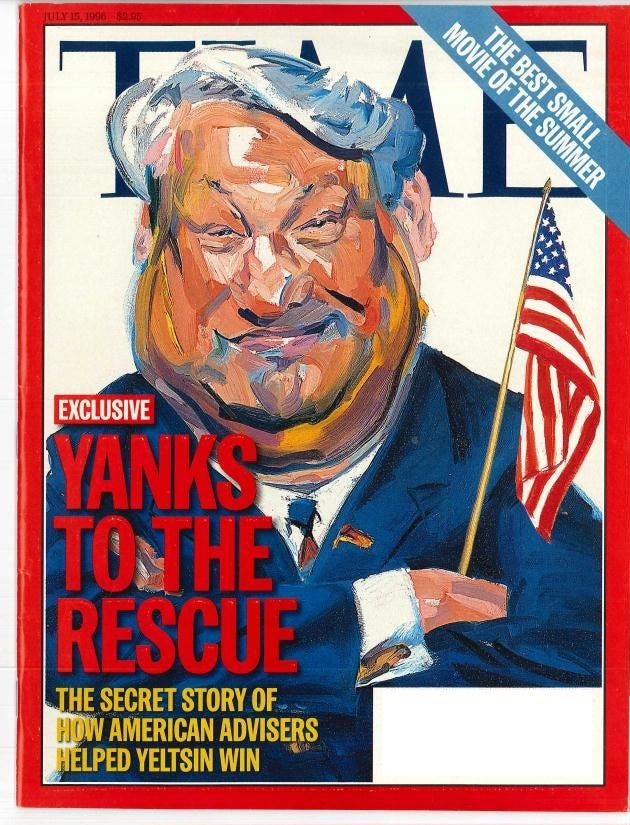
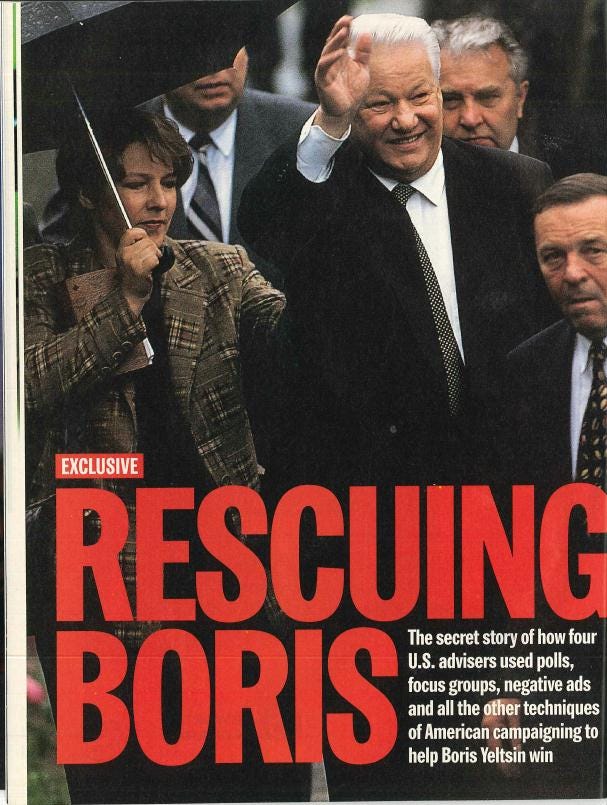

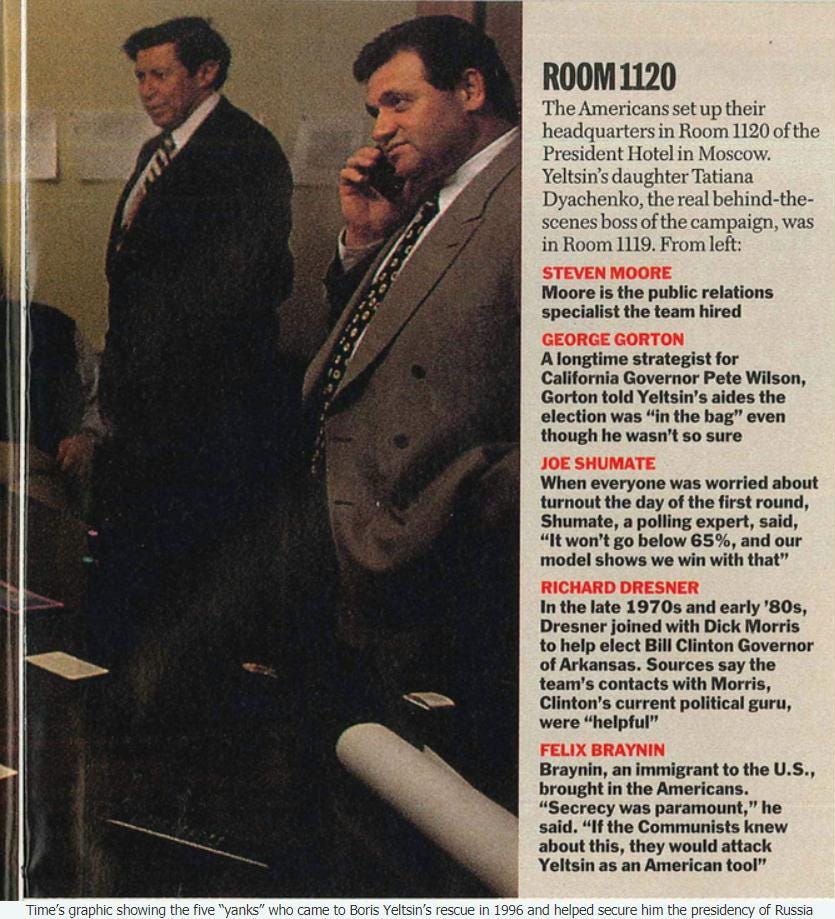
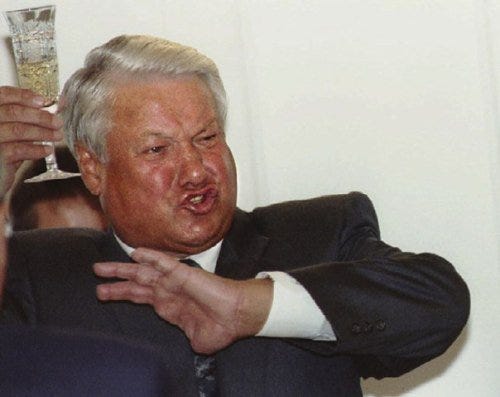
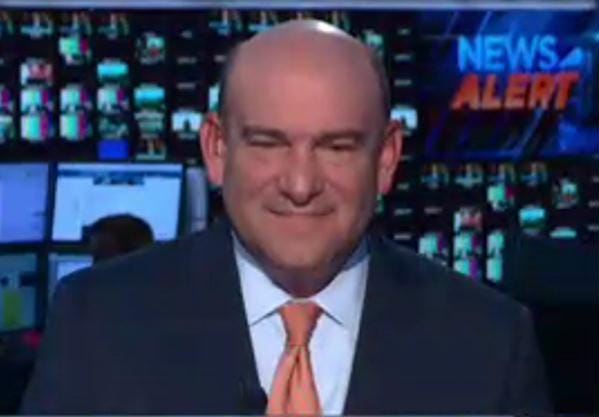
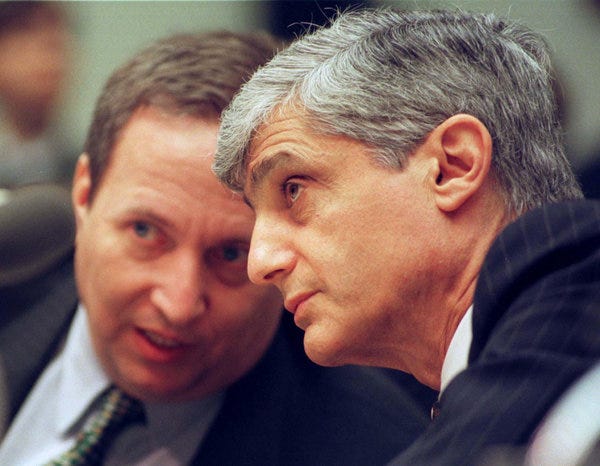
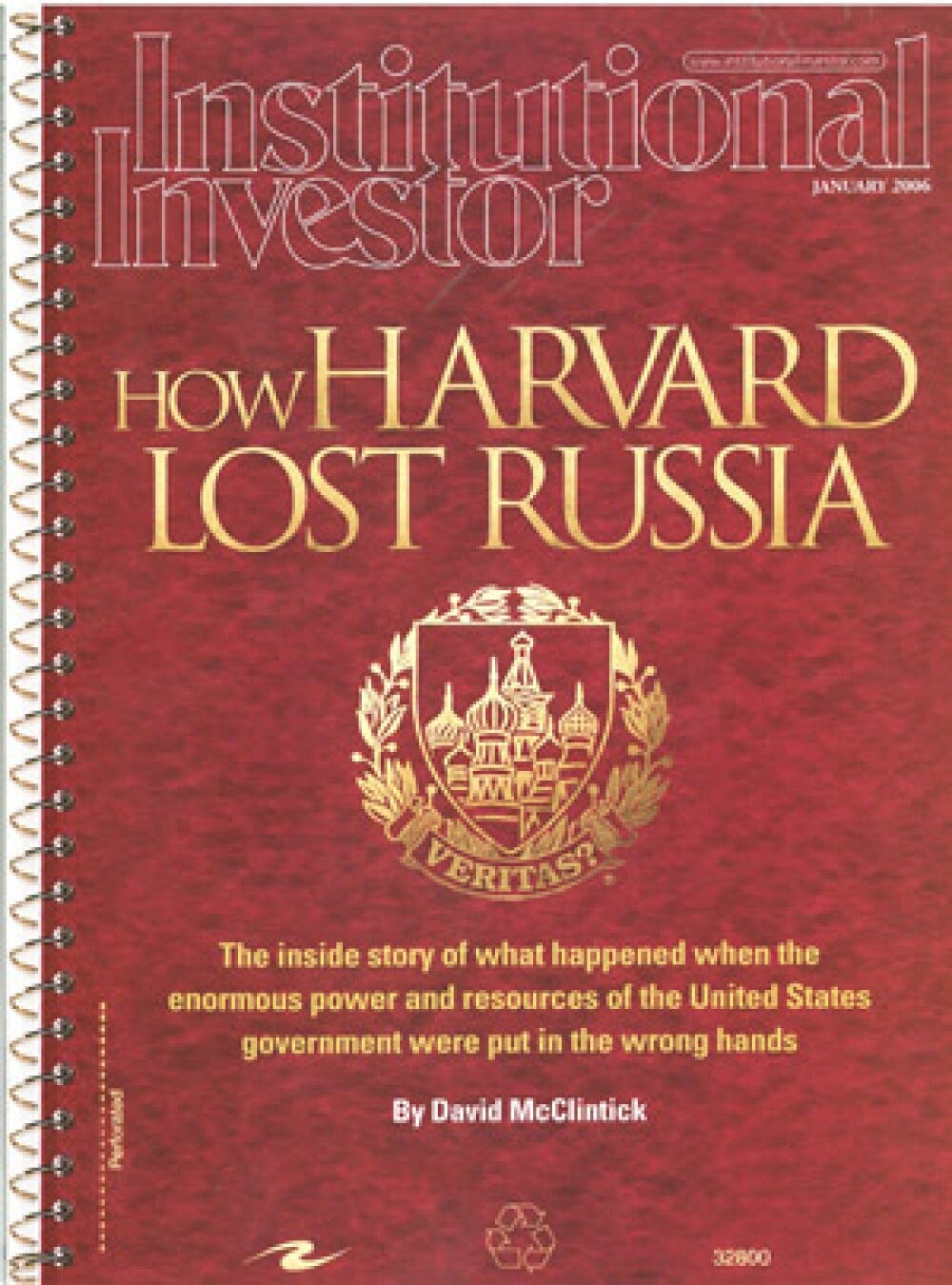

I'm a former EM investment manager and in May 1998 went to St. Petersburg at the invitation of Morgan Stanley for a conference to mark the opening of their Russian office. The first speaker at the conference was the Swedish economist Anders Åslund who said the whole place was about to collapse. The people at MS were not pleased.
As an aside that night they organized a booze cruise around the waterways of St. Petersburg. We went for dinner to a Soviet era building they rented that all the party bigwigs used. As we disembarked from the boat there was a group dressed as the Beatles who broke out into "Back In The USSR". Quite surreal.
Another excellent write-up Rudy. Thanks for the backstory, most of which is not common knowledge.